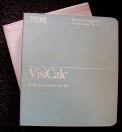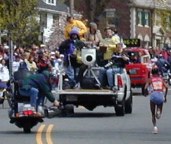danbricklin.com/log
|
||
|
|
Starting April 17, 2000
Digital cameras roll on, It's cool when an insider leads a rebellion, Why should a product want to be "the next VisiCalc"?, Watching the Boston Marathon, Post-it Notes are 20 years old
17Apr-3May00
2000_04_17.htm
|
|
Wednesday, May 3, 2000
Digital cameras roll on
InfoTrends Research Group released a new study which "...reveals that revenue from digital camera sales in North America will reach $1.9 billion this year, exceeding revenue generated from film camera sales by almost 10%."
Michelle Lampmann, market research analyst, said that "already, the most popular use of digital photos is sharing them via the Internet, either through email or on Web sites. Digital photos are becoming the most shared personal content on the Internet, following email."
Tuesday, May 2, 2000
It's cool when an insider leads a rebellion
Passover was a couple of weeks ago. In listening to some commentary on the radio about the holiday, I started thinking about the timelessness and general interest of some of the themes in the Bible. In the Passover story, which we tell over and over again each year, we learn of Moses, who was born an Israelite slave but brought up as a free member of Pharaoh's court. It took him, a temporary Egyptian insider, to lead the people.
 Piece of matzo from Passover
The story of a temporary insider who leads a rebellion is a timeless story that people like to pick up on, I thought. My mind looked for a computer example. Years ago, such a story was of the young Bill Gates, working with IBM to make their PC, going off on his own and helping create the PC industry that toppled much of IBM's dominance. Oh, my! Bill Gates as Moses! (Would it then be Steve Ballmer as Aaron, the better talker?) That was how the story was portrayed. There must be other examples, I thought.
Well there are, and we still hear of the insider leading a rebellion. Today, of course, Bill and his company are the dominant ones, and a story that comes up over and over is of Rob Glaser, once VP of Multimedia and Consumer Systems at Microsoft, now leading its competitor in multimedia, RealNetworks. Rarely do you hear a story about RealNetworks without hearing of "...the man who founded RealNetworks after spending years as a Microsoft executive." (News.com)
Just some thoughts while driving home from work while listening to the radio...
Tuesday, April 25, 2000
Why should a product want to be "the next VisiCalc"?
Periodically, writers refer to VisiCalc when they want to mention a well-known pioneering program, once the most popular, that was superseded and now rarely used. While it's not the greatest feeling to have people think of one of your creations as an example of "what was and is no longer", it is nice to be remembered enough 20 years later to be used as a common example of something that was dominant. I like this better than not being remembered at all.
  A dumpster, symbolic of discarded stuff; an original IBM PC VisiCalc package
I received an email from Leonard Grossman pointing out a story in PCWeek that mentioned VisiCalc this way:
"Will a shakeout in the hosted application space happen, and if so, how do you keep yourself from picking tomorrow's VisiCalc today?"
- Article in PCWeek, 3/27/00
Reading the article, I saw that I didn't agree with the reference. Actually, in this case, you do want to buy something that would be the next VisiCalc when it is superseded. I've posted a copy of the email I sent to the author of the article. Here's an excerpt:
VisiCalc was the dominant product of its time, and was the one from which the inevitable next dominant product, 1-2-3, could import data seamlessly. 1-2-3 is one you can seamlessly move ahead to the current dominant product, Excel. Most of VisiCalc's early competitors, the supposed "VisiClones and CalcAlikes" as they were once referred to, did not have such a smooth migration path.
In the long term, it is unlikely that any particular ASP will survive without you needing to migrate your data to something else.
You can read my email to the author in the Writings section of my web site.
Wednesday, April 19, 2000
Watching the Boston Marathon
One of the joys of living in Newton, Massachusetts, is that you can easily get to see the Boston Marathon as the runners go up Heartbreak Hill. I took some pictures this year and wrote a little piece that tries to convey some of the feeling of being in that crowd.
TV trucks following the lead woman, people cheer for everybody
Read my "Watching the Boston Marathon 2000" write-up to learn what it's like. It has lots of pictures.
Monday, April 17, 2000
Post-it Notes are 20 years old
20 years ago 3M Post-it Notes were introduced. It is one of the great stories of invention, and even includes singing in church. A failure for one purpose became the solution to another due to an accident. The story is not just of the invention, but also of getting it to market. Here are some links:
|
||
|
© Copyright 1999-2018 by Daniel Bricklin
All Rights Reserved.
|
||

